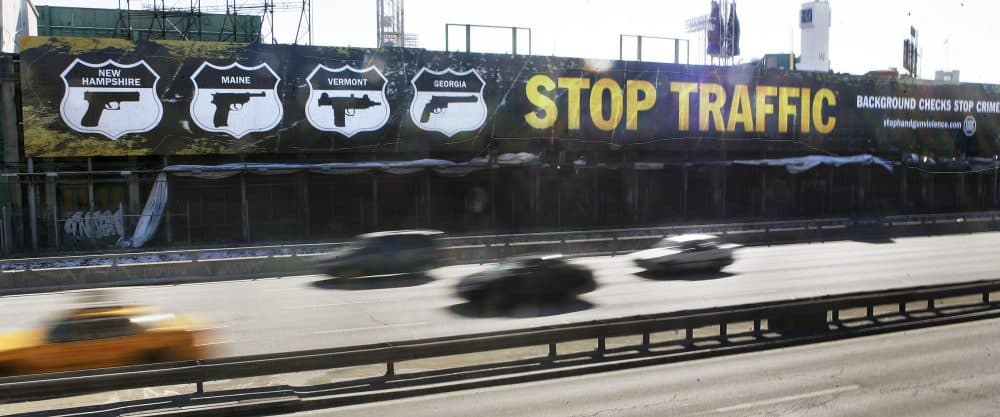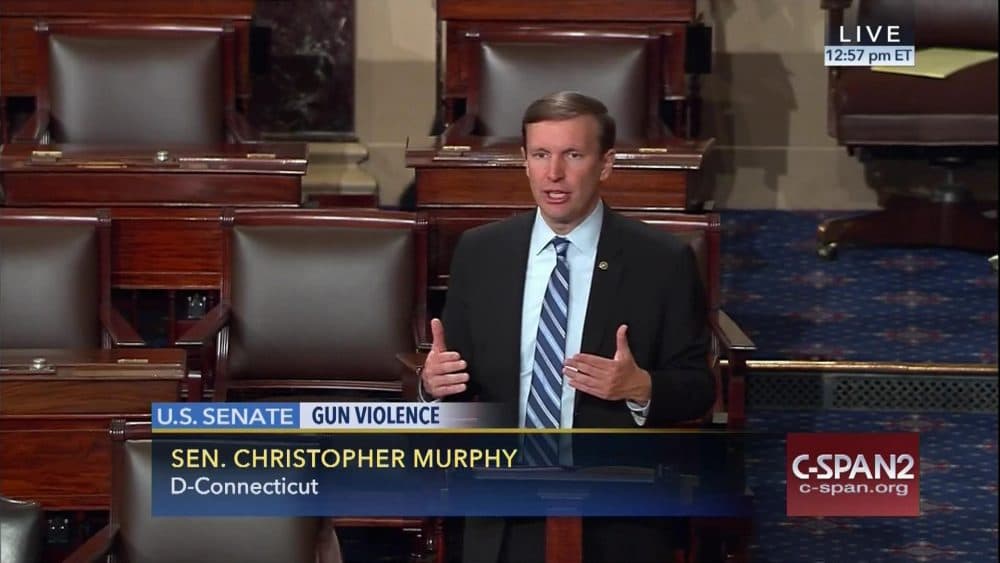Advertisement
Amid Heated Debate Over Gun Control Following Orlando Shooting, A Look At Mass. Laws
ResumeThe shooting rampage that killed 49 people in an Orlando nightclub has reignited the debate about the need for stricter gun control laws across the country. Florida has some of the least restrictive gun laws in the country, and that allowed the shooter to legally purchase an assault rifle and high-capacity magazines.
That wouldn't have been possible in Massachusetts, which has some of the nation's strictest gun laws. However, there's still an active debate about the effectiveness of the laws.
Comparing Massachusetts And Florida Gun Laws
Following the horrendous massacre in Orlando, John Rosenthal expresses the feelings of many.
"I feel sick. I feel frustrated. And I feel sad," he said. Rosenthal is the founder of Stop Handgun Violence and is among the state's fiercest proponents of gun safety laws.
Frustrated, sad and sick as he is over the slaughter in Orlando, he takes heart that here in Massachusetts, there are laws designed to limit gun violence — which states like Florida don't have. Among them: strict licensing requirements; a mandate that firearms be stored safely; a ban on military-style assault weapons — the kind used by the Orlando shooter, Omar Mateen; and a ban on high-capacity magazines, which Mateen used as well.
"A large-capacity ammunition magazine allows you fire however many rounds you have without reloading. When you reload, you're vulnerable. Police carry 13 to 17 rounds, then they have to reload," Rosenthal explained. "They're vulnerable. We should care about that."
Mateen used 30-round magazines, which helped him carry out his slaughter with ruthless dispatch. Here in Massachusetts, magazines are limited to 10 rounds. Another key provision in Massachusetts law — which Florida doesn't have — gives police chiefs discretion over who gets a gun permit.
"That particular aspect of the law was something that was very, very important to us as chiefs of police," said Leonard Campanello, chief of police in Gloucester. He said the law gives chiefs like him the authority to take into account what they know about the applicant, but what a criminal background check might not reveal. For example, is he mentally unstable? Is he a hothead, prone to violence? Is there evidence that he beats his wife?
"And then they apply for a gun permit, but their record does not reflect those confrontational moments ... but we as police chiefs, having reviewed their in-house record, say, 'Gosh, this is a person who flies off the handle in a second.' And giving him a gun may cause you pause, and there should be a review process in that," Campanello said.
In the case of Mateen, the FBI had interviewed him twice because of reports of "extremist behavior." And his ex-wife's father said police were called to his house "more than once," because he was abusive to his daughter.
Campanello won't speculate if such a law could have prevented the tragedy in Orlando.
When Measuring Gun Deaths And Crime, Figures Matter
But Rosenthal said laws like this make it much harder for criminals to get their hands on guns in Massachusetts.
"And that's why we've been able to reduce gun deaths in this state by 60 percent since 1994," said Rosenthal. He pulls that figure from the Centers for Disease Control.

But Jim Wallace of the Gun Owners' Action League of Massachusetts, the local NRA affiliate, said, "Since the 1998 gun laws were put in place in Massachusetts, gun crime actually tripled while the rest of the nation's gun crime was declining."
Wallace said that suggests the state's gun laws don't work. So what's going on here?
In fact, Wallace and Rosenthal are looking at different time periods and measuring different things. Rosenthal looks at all forms of gun violence, including suicides, all the way back to 1994, when overall gun crime rates were much higher than today.
Wallace's statistics go back to 1998, when gun crime was already coming down, and the state's gun laws were first passed. But he omits suicides, which account for a majority of the country's gun deaths. And Wallace doesn't take into account this: the high number of gun crimes in Massachusetts — nearly two-thirds of them — that involve guns from out of state. That helps to explain the increase of certain crimes.
But beyond the statistics, Wallace said trying to restrict guns won't stop terrorists.
"Look at the Paris terrorist attacks. Everything they had was banned throughout the entire continent. Didn't stop them. So obviously our problem isn't the gun. It's the terrorist that went on a rampage," he said. "Does it really matter what type of gun he had? Or what size magazines he had?"
Robyn Thomas, executive director of the Law Center to Prevent Gun Violence, argues that they do matter.
"Does the kind of weapon and the type of ammunition matter in terms of how many people are injured and the chances of that person being stopped? Absolutely," she said.
Thomas points to the 2011 shooting in Tucson of former Congresswoman Gabrielle Giffords and 18 others by a man with a semi-automatic handgun.
"When his first magazine ran out and he went to go put in another magazine, I think he fumbled, and that was when the people present were able to tackle him and stop him," she explained.
So, Thomas said, Massachusetts' ban on assault weapons and high-capacity magazines matters. On the other hand, less restrictive gun laws in nearby states, like Maine and New Hampshire, mean crime guns find their way to Massachusetts. That's why Rosenthal said it's time for Congress to finally act, something lawmakers failed to do following the massacre of 20 schoolchildren at Sandy Hook Elementary school in Connecticut back in 2012.
"There have been — as of today — 1,000 mass shootings of four or more people in America since Sandy Hook. What is missing is the majority of Congress' backbone," he said.
Murphy's Filibuster For New Gun Laws

On Wednesday, Sen. Chris Murphy, a Connecticut Democrat, launched a filibuster to pressure Republicans to back legislation to require universal background checks and prevent suspected terrorists from purchasing firearms. Other Democrats, including Massachusetts Sens. Elizabeth Warren and Ed Markey, joined him.
It's unclear if they'll succeed, but the murders in Orlando have once again forced the country's lawmakers to confront America's gun problem.
This segment aired on June 16, 2016.
